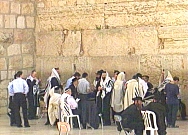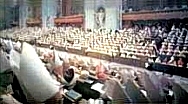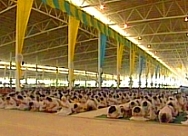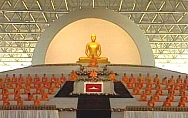|
Peter’s Correspondence on the Actual Freedom List with Correspondent No 49
PETER: Hi, You recently wrote a general post to the list to which I thought to reply. I particularly liked your post as you were upfront in saying you have been doing some thinking about the subject lately – and autonomous thinking is something that is to be encouraged. I know from experience that many things Richard said forced me to think about what he was saying and whenever I did I invariably found one of ‘my’ beliefs – one of ‘my’ emotion-backed thoughts – preventing clear thinking from happening. I was simply going to post my encouragement for your efforts but I will make comment on some of the points you raised mainly because I personally found the whole subject of the instinctual passions to be crucial to my understanding of the actualism method. I came to understand that the whole mythical battle twixt good and evil which infuses all of human thinking and feeling is nothing more than the covert or overt expression of the battle between the ‘good’ and ‘evil’ instinctual passions. Simultaneously I came to understand that the whole spiritual notion that good and evil were the result of good and evil spirits – or for the male of the species, right thinking and wrong thinking – was nothing more than what it is, archaic superstition. These understandings were the final straw that broke the back of my remaining spiritual goody-two-shoes beliefs. This in turn opened the door to my understanding, and then experiencing in a PCE, that all of human malice and sorrow is the result of the ‘self’-centred instinctual passions of fear, aggression, nurture and desire. Armed with the knowledge that ‘my’ instinctual passions were the very sustenance of my ‘self’-centred identity I was the able to observe and successively disempower these passions such that I could increasingly become more happy and more benign. RESPONDENT: I’ve been thinking and asking and reading about this subject lately too. I think we should separate instinct and passion. That is if we take passion to be the equivalent of emotion. Now maybe what we mean by ‘passion’ is ‘strong expression’, but I think it would be better to assume that instincts are something that always tend to express strongly. PETER: All animate life forms have certain defensive and offensive instinctive reactions. However as an actualist I am vitally concerned about the instinctual survival passions because they are the source of all human malice and sorrow. In my experience, I would agree that when the instinctual passions really break through and come to the surface, they are the strongest emotions that a human being can experience – when fear turns to dread, when aggression manifests as a lust to obliterate, when nurture turns to self-sacrifice and desire turns to insatiable lusting. However their effects are pervasive in that they are the very motivating force of the human condition of malice and sorrow.
RESPONDENT: That way we can separate emotion/passion from instinct and get a better look at it. The way I see it at this moment is that instinct is an inherited tendency, something a being is born with, and passion/emotion is something learned after conception. PETER: The survival instincts are genetically-encoded in all human beings and are inevitably manifest as instinctual passions in all human beings. Contrary to ancient beliefs, human beings are not born pure and innocent – they are all pre-programmed to feel fear, aggression, nurture and desire and these emotions are usually evident in action in all children by about age 2 –
RESPONDENT: Instincts are there because it is useful for the survival of the organism to have survival behaviours in place from the start. PETER: In a predatory world, survival instincts and the resulting hormonally-produced instinctual passions are essential if a species is to survive. The proposition that actualism presents is that these passions – the source of human malice and sorrow – are now not only utterly redundant, but they actually stand in the way of peace on earth between human beings. (Editorial note: This above assertion by feeling-being ‘Peter’ (about
‘the resulting hormonally-produced instinctual passions’) is at odds with what ‘he’ wrote in the Actual Freedom Library: “The
arising of instinctually-sourced feelings produces a hormonal chemical response in the body, which can lead to the false assumption that
they are actual.” RESPONDENT: The emotions are learned later and coloured by the specific environment and linked to the instincts to better assist the organism’s instinctual expression in the environment in which it finds itself. PETER: This is what the therapists and spiritualists would have us believe but it flies in the face of scientific evidence to the contrary. It was a blow to my pride when I discovered that the extent to which holding on to spiritual beliefs involves denial of empirical fact. In the end the only reason I pushed on was that it was even sillier to remain being silly. RESPONDENT: I’d say only the higher animals have this additional adaptive quality. I think there are many who believe emotions exist only in humans, some who acknowledge their existence in apes and chimps and a few who think other animals experience them. PETER: The human species, no longer needing to fear and fight other animals in order to survive, are by and large nowadays left with only each other to fear and fight and they do that with gusto. An estimated 160 million human beings were killed by their fellow human beings in wars in the last century alone, not to mention all the genocides, murders, rapes, assaults, child abuse, domestic violence and so on. The question I asked myself was why would I want to remain an instinctually-driven animal? RESPONDENT: So we, as humans, have an instinct that incites us to want to belong to the family and the tribe. Previous relations who did not have this instinct did not survive and reproduce as successfully as those who did. PETER: We have had some discussions in the past about ‘an instinct to belong’ but that the survival instincts in human beings is species-specific and this specificity manifests itself as a feeling of wanting to belong to the species – a strange longing given that we are all fellow members of the same species. But the main reason for the longing to belong is that ‘me’, the parasitical entity trapped inside this flesh-and-blood body, always feels separate from similar-feeling parasitical entities and always feels isolated from the actual physical world. RESPONDENT: Today I find myself in a nation, not a tribe. I actually don’t need the tribe nor even the family personal connections any more to survive and reproduce, yet I instinctively experience the drive-desire to belong to a closely identified group. Not belonging can bring on intense sensations of sadness and fear. Not belonging would likely have meant death to my ancestors. When that inherited drive is not being satisfied I feel uncomfortable, I have a sensation of physical discomfort, thoughts about wanting to belong, and behaviours toward finding a group to belong to. If a group does not accept me I feel sadness, pain, this helps motivate me to find a group that will accept me, then I’ll feel pleasure. As a baby I learned how to couple my instinctual drive for belonging with emotions expressed in my family that in times past would have enabled me to have behaviours that would assure acceptance in my given tribe. PETER: My years in the midst of a spiritual group finally deflated my need to belong to a group. A little of the story will give you a flavour –
And as for the good feeling of belonging to a nation, I came to see that all of the despotic regimes and messianic tyrants throughout history have flourished because of, and been nourished by, precisely the same chest-swelling nationalistic feelings I once felt for the country I was born in. Feeling nationalistic pride is simply adding and abetting the mass expression of the instinctual passions. RESPONDENT: So what are emotions: I’d say physical sensations either pleasurable or painful, coupled with a specific constellation of thoughts, resulting in a specific behaviour. An instinct, I would say, is a physical sensation that brings on a specific behaviour. PETER: In theory instinctual reactions and instinctual passions can be thought of as being separate in human beings, but in practice they are never separate. An instinctual reaction automatically produces a flow of chemicals designed to prime the body for a fight or flee response and these chemical flows are almost instantaneously ‘felt’ as emotional responses – the heart-pumping, gut-wrenching feeling of fear, the neck-tightening, pulse-racing feeling of aggression, and so on. (Editorial note: This above assertion by feeling-being ‘Peter’ (that ‘an instinctual
reaction automatically produces a flow of chemicals’) is at odds with what ‘he’ wrote in the Actual Freedom Library: “The arising of instinctually-sourced
feelings produces a hormonal chemical response in the body, which can lead to the false assumption that they are actual.” RESPONDENT: So it is the thought element of the emotion that is special and it is what allows us to have enormously varied ways of expressing our instincts. PETER: In my early days of actualism, whenever I asked myself ‘How am I experiencing this moment of being alive?’ I most often came up with a thought response, in other words I often thought that I was thinking something that I shouldn’t be thinking and all I needed to do was change my thinking and that would be that. I soon discovered that right thinking and wrong thinking was nothing but the morals and ethics and beliefs ‘I’ had taken on board as part and parcel of my social identity and that what I was calling a wrong thought or a bad thought was really a feeling. As an example – sometimes I would come up with an answer that ‘I was just thinking about something that happened a while ago’. A little further probing and I would come up with an answer that ‘I was concerned about something that happened a while ago – did I do the right thing’. A little more probing and I discovered I was anxious about the repercussions, and a little further I discovered that I was feeling fearful of the consequences. What started off as me thinking I was merely thinking, eventually revealed that I was really having a feeling at the time, and a strong one at that. I only say this because it is common that people have a good deal of difficulty in distinguishing between thoughts and feelings, and none more so than the male of the species. RESPONDENT: I began learning the applicable thought patterns at birth (and probably even before birth). The question is, when do I stop linking learned thought patterns to instinctual drives and if I can link them, can I unlink them, or replace them with new ones? The answer appears to be yes. During the last year I’ve watched my emotions. I’ve felt fear, sadness and resignation and anger and found under it very often the drive to belong – to feel safe in a secure relationship to others. When I ponder this emotion I find that (given my personal situation) I am actually safe and secure in this physical world and will continue to be so regardless of which particular person I associate with. This produces an internal smile, a quiet sensation of happiness. This has allowed me to quickly drop the suffering of rejection and not-belonging and the malice I have felt toward others for excluding me. Since I’m less angry, sad, and resigned my relations with others have become more amicable and productive. I’m happier and more harmless. PETER: Great, hey. When you say ‘during the last year I’ve watched my emotions. I’ve felt fear, sadness and resignation and anger ...’ – these aren’t learnt thought patterns, these are feelings that you have become aware of as they are happening, i.e. you have labelled them and felt them as they were happening. If you set your sights on becoming happy and harmless then, by becoming aware of feelings of sadness and animosity as they arise, you can pull the rug out from under these feelings and get back to being happy and harmless again as soon as possible. As you seem to be reporting, this process of continual awareness and disempowerment does produce tangible results. RESPONDENT: I’ve had feelings of rejection and being misunderstood from responses and non responses on this list. It’s fuel for the fire that can burn away self-importance and a reminder that malice and competitiveness are there to be burned away too. PETER: I do acknowledge that writing on this list can sometimes be a challenging business as one gets no support here for one’s dearly-held beliefs, no sustenance for one’s bitter-sweet sadness and no validation of one’s pet animosities. But then again, would you have it any other way? The stakes are high on this list – peace on earth is as high as the stakes get in my neck of the woods. Once again, I appreciated your post. It’s good to hear success stories.
RESPONDENT No 59: It’s true to say that the genetic coding is supplied complete to each individual. PETER to No 59: Oh, good. Can we agree then that the instinctual survival mechanism – that
which gives rise to the instinctual passions of fear, aggression, nurture and desire in human beings – ‘is supplied complete’ to each and
every member of the human species? Do realize that this is no little thing to agree to because it is completely at odds with all of the spiritual teachings that have it that we are born innocent beings and only corrupted by conditioning or that we are all blank slate souls who have to suffer the trails of being trapped in a corporeal body in an alien physical world? RESPONDENT: I don’t see spiritualists as all saying children are born as blank slates. I’ve had people from two different Christian sects (Jehova’s Wittness and Mormon) – those who go about knocking on doors looking for converts – tell me that children are born with original sin, and they each offered as an example the obvious anger displayed by infants who are not getting their way. They offer religious salvation solutions for this sin. PETER: Yeah, point taken. It was a bit sloppy of me. I forgot about the fire-and-brimstone ‘repent ye sinners and ye shall be saved’, which really means ‘ye better join our group … or else …’. I had been watching an Oprah Winfrey program – mainstream popularist Christian-New-Age belief – before I wrote what I wrote so that had obviously influenced what I wrote. Despite the fact that the Christian teachings are founded on the notion that human beings are born in sin and that ultimately peace is only to be found after death, many Christians also hold a contradictory belief that nurture will bring peace on earth. They believe that Good parenting will combat Evil, that Love will conquer Hate, that emotional catharsis is ‘cleansing’ and ‘healing’, that one needs to heal ‘old childhood wounds’, that one needs to seek ‘closure’, that suffering makes you stronger, and so on and so on. It’s quite amazing to me how many disparate beliefs people can hold at one time – be they pop-religion, pop-psychology, pop-science or whatever – and how they can insist on keeping them all despite their contradictory nature and in spite of their obvious failures to bring anything remotely resembling peace on earth between human beings. RESPONDENT: The new and different offering of AF is the clear recognition of what is there: the biologically inherited emotional structures with their mental connections, and a workable and easily describable method for disentangling from them. PETER: And in order to become both happy and harmless, it is essential to question all of the beliefs that are the tried and failed ways of ending human malice and sorrow – it stands to reason that ‘my’ hanging on to any of these beliefs can only prevent ‘me’ from doing whatever is necessary for me to become actually happy and harmless. It is no little thing to abandon all of Humanity’s accrued wisdom – all of the unliveable morals and all of the unworkable ethics – and to start to think for oneself such that one can stand on one’s own two feet, no matter what the consequences. That’s the dare in actualism – how far is one willing to go in abandoning one’s cherished beliefs?
Peter’s Text ©The Actual Freedom Trust: 1997-. All Rights Reserved. Disclaimer |



